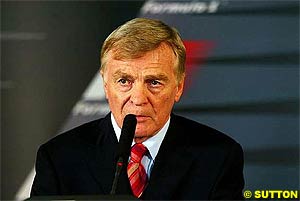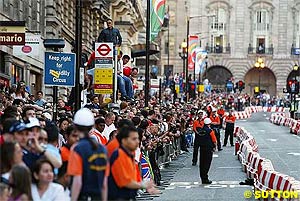Atlas F1 Magazine Writer
Fresh from the Formula One paddock
It was a one-line media announcement which shook Formula One, and, for that matter, the World Rally Championship and the rest of four-wheeled motor sport, rigid. "Max Mosley has informed the FIA General Assembly that he will step down from the position of FIA President in October 2004," the release announced somewhat succinctly to an arriving media at Magny-Cours last Thursday.
Craziest of the lot (or is there fire there?) went that Mosley had inherited a fortune from his mother, who, as Lady Diana Mosley, had lived in Paris since the forties. So, continued the tale, as an employee - even if unpaid - of a French-based body, the former patent law barrister had removed himself from the clutches of the Gallic country's Draconian inheritance laws. Why else had he very recently decreed the FIA's operating seat should be Monaco-domiciled and suddenly moved himself there?, went the "evidence".
Come 16:00 on Friday the media centre was packed. Suavely Mosley opened, then outlined four topics: both incidents at Indianapolis; the 2005 (and beyond) rules; his departure from the highest post in motoring, and motor sport.
Yes, the FIA was comfortable with the manner in which the first corner had been handled, as it was over Alonso's crash and the one suffered by Ralf Schumacher, who, just the day before, had been withdrawn from at least six Grands Prix due to cracked vertebrae undiagnosed in Indianapolis. All manner of medical statistics were trotted out, and, it seemed, the medical crews had reached the comatose German driver 21 seconds too soon rather than one minute 39 seconds after he had thumped a SAFER wall at 320 km/h. And, oh, allowing Juan Pablo Montoya to circulate 57 laps had enabled the Colombian to a test in a manner which the FIA intended banning ASAP, if not sooner.
In Mosley's second item, namely the rules, he fundamentally advised that changes to rules were on an agenda to be circulated to all teams on 6 July by Race Director Charlie Whiting, but the bottom line was simply that there had been unanimous disagreement over aerodynamics, engines and tyres, that there was no detail on aero, that both tyre suppliers could continue, and that an equivalence formula would govern a choice of V8s or 10s - sort of what this column suggested after Mosley's Monaco summit in early May.
Should we, as F1 fans, be excited? Well, this book has been read many times before, and only the front cover illustration and type font have changed - so it came across at Magny-Cours last Friday. Of course, certain aspects of the regulations will evolve, for, surely, there is unanimity on the need for cost and performance reduction; it is their execution that is causing so much short- and long-term dissent. And, let us not forget that, in the 80s, Mosley and Ecclestone forced through the need for 100% agreement, and now the monster has returned to bite its feeders - to the detriment of the sport and all who love it.
Then came the point for which the F1 media had assembled in that large room behind the Magny-Cours podium: "about me". Mosley's decision was not, he stressed, the result of some super-duper job offer, nor was he, as far as known, suffering from ill-health; rather that he no longer found it satisfying to sit in meetings with team bosses who constantly changed their minds. But, some found it difficult to accept that a highly intelligent and worldly wise man had laboured and led an organisation for all of 13 years before realising that 10 highly competitive, focussed individuals - well down, please note, from the 20-or-so team bosses in F1 when Mosley gained the presidency in 1991 - could hardly be expected to relinquish what competitive advantages they have established over the past few decades.
Whilst Mosley's Thursday statement came as a shock, in retrospect it had all the hallmarks of the sort of meticulous planning for which the man had, rightly, become admired for. Consider:
On 12 May Mosley announced that he was stepping down from the chairmanship of EuroNCAP, Europe's leading independent crash test programme. At the time it seemed a normal move by a man simultaneously stirring more than a few broths. But, with the benefit of hindsight, it is clear that this was the start of a winding-down process.
"Getting this active safety right is a major challenge and will require more time from the chairman than I am now able to give. I am therefore stepping down after eight years, but I am confident that the FIA and the FIA Foundation will continue fully to support EuroNCAP both financially and technically," he explained, and nobody picked up on the lack of any personal commitment by Mosley, as President of the FIA and a Trustee of its Foundation, for the programmes?
Just before that step-down Mosley had, according to sources, attempted to oust the Chairman of the Karting Commission, Yvon Leon. This failed, as did Mosley's moves to get the sub-section back "under control". So, karting, trivial as it may seem in world sporting terms, heralded two defeats for the barrister in three months. When the World Council voted against Mosley's intention to create a two Vice President positions - one for sporting matters, the other for road issues - whilst suggesting Ferrari names such as Jean Todt and Marco Piccinini in his plans (whilst contemptuously dismissing Sir Jackie Stewart for Office), the tally became three in as many months. This indicated an erosion of confidence in his governance, particularly when the karting matters went against him 18-5.
At the same time, attempts to change qualifying faltered after no unanimous decision was reached by team bosses who, it was said, had originally agreed to change. But, suggestions abound that Mosley himself changed the proposals by demanding that the 107% cut-off be reintroduced - which could well result in the future non-qualification of Minardi and Jordan entries. Any wonder those, at least, voted against change? Do turkeys vote for Christmas?
Consider the Safety Car regulation. After Monaco a bulletin advised that the procedure would change, then that was rescinded.
That all was not well in the Presidency of Maxwell Rufus Mosley had, though, been clear for a while. In April, FFSA President Jacques Regis criticised the President publicly; last week he repeated his concerns to French journal Autohebdo. Regis is also a vice president of the FIA. In May a triumvirate of Frenchmen let it be known that they were collating a dossier on their President - nothing sinister, you understand, just substantiation that Mosley's governance wallpaper was peeling - and, possibly, he realised his chances of re-election in October 2005 were slimming.
That he lost both of last week's votes by identical percentage defeats (78%) indicates that people, not principles (and principals?), crushed him. So, a clear case of a loss of support as suffered by most leaders of democracies, and one deserving of an elegant exit by the President of an international body with wide-ranging influence in matters social, sporting and technical.
Why then insult team managers, one of whom Mosley referred as "not the sharpest knife in the box', why enter into sarcastic criticism of the Indianapolis doctors who criticised the Ralf Schumacher response, and why voice overall disapproval of the sport he has led for 13 years? Why maintain that it is "only in the last six or seven years we have seen these over-700 horsepower (engines) come in", when the turbo cars had double that 20 years ago? (And, there was not a single power-driven fatality, if one accepts that Elio de Angelis' death came through a lack of safety standards at a test, between 1983 and that Imola weekend 11 years later.)
Why suggest "You rely heavily on the safety car driver and also there is a back-up in that all the teams are talking to their drivers, and if somebody sees something they will transmit it to the tower since we are all in radio communication these days" to justify not stopping the Indianapolis race in the face of fibre shards strewn over the circuit, then cite a lack of procedure, "which could not be improvised on the spot", as reason for not taking the field, in the wake of Ralf Schumacher's crash, through the pitlane. Surely radio contact could have been used to "improvise"?
Finally, why, in reply to a question as to whether he, Max Mosley, would change his mind (about stepping down) state: "I am not a Formula One team principal, so I don't change my mind every five minutes," when he was, in fact, a team principal - on results, not as "sharp' as some, it must be said - and obviously changed his mind about being a team boss?
As one team principal said immediately after Mosley's presentation: "All we need do now is sort out the Rally Commission."
Has London shot its bolt? Sure, the "F1 comes to Regents Street' festival was a roaring success by all accounts; maybe too much so in view of the crowds and lamentable lack of their control.
But, the 200,000 or so strong crowd thronging the streets will have sent a clear message to Ecclestone that London wants F1 - at almost any cost. So brace yourselves for some outrageous ticket prices should London's bid for a 2007 event be successful.
Mayor Ken Livingstone said he believe that a London event could attract two million spectators to the capital. With that he just chased up the host fee by another 2000%...

 Then came a further notice: The FIA President would be addressing the media at 16:00 on Friday afternoon. Of course, in a sport where the speed of suppositions is second only to Renault's launch rate, rumours flew thick and fast. "Max realised he lost the support of the World Council, so he's thrown his toys away," went one; another swore he, the President, had a debilitating illness; a third suggested Mosley was formally joining Bernie Ecclestone's Formula One Group.
Then came a further notice: The FIA President would be addressing the media at 16:00 on Friday afternoon. Of course, in a sport where the speed of suppositions is second only to Renault's launch rate, rumours flew thick and fast. "Max realised he lost the support of the World Council, so he's thrown his toys away," went one; another swore he, the President, had a debilitating illness; a third suggested Mosley was formally joining Bernie Ecclestone's Formula One Group.

 But, by showing their hand so publicly the organisers have given Bernie Ecclestone a whip hand over Silverstone in the run up to the British Grand Prix - after all, never again can circuit owner BRDC suggest that no facility other than the Northampton circuit could conceivably host the race.
But, by showing their hand so publicly the organisers have given Bernie Ecclestone a whip hand over Silverstone in the run up to the British Grand Prix - after all, never again can circuit owner BRDC suggest that no facility other than the Northampton circuit could conceivably host the race.
|
Contact the Author Contact the Editor |
Please Contact Us for permission to republish this or any other material from Atlas F1.
